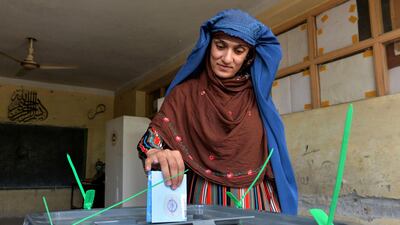With just one in five registered voters turning up yesterday to polling stations in Afghanistan's long-anticipated presidential election, it might seem there was little cause for celebration. But in the precarious peace that exists in the country, the fact an election took place at all, in relatively calm circumstances, is something of a miracle. Despite threats from the Taliban to disrupt the process and dozens of attacks on polling day, in which at least four people were killed and 80 injured, the violence was more muted than it has been on days when there has not been a significant event. That, together with the fact more than 70,000 police officers were called upon to monitor booths, says much about the fragile state of security in the country. It is critical now that whoever wins the election has a firm mandate to steer Afghanistan towards a safer and more prosperous future.
The turnout of about two million, in a country with a population of 35 million, suggested security fears and disillusionment with the political process had kept voters away. That figure is lower than any of Afghanistan's previous three elections. Rightly, Javid Faisal, the spokesman for Afghan President Ashraf Ghani's re-election campaign, paid homage to the "great valour" people showed in turning up "in the face of Taliban". But it is important to remind those in power that it should not take bravery for Afghans to have a say in their future; that should be their fundamental right, without fearing for their lives in the process.
With three weeks until initial results indicate which of the 13 candidates, if any, have a 51 per cent majority, followed by a possible second run-off vote between the top two candidates, it is crucial to give legitimacy to the process so that the eventual victor can secure a path to long-term stability. That means involving the future president and his government if talks between the US and Taliban are resurrected, as well as talks being conditional on the Taliban recognising the validity of that government and desisting from violence.
Many Afghans fear a return to the violence and restriction of rights imposed under Taliban rule, which sparked the 18-year war in Afghanistan. The country’s other challenge is, in a sense, a more pernicious one: to tackle the feeling of disenfranchisement among voters, who fear ineffectual leadership and a repeat of the 2014 election, mired by claims of vote-rigging and ballot stuffing and resulting in months of squabbling and weak governance before the US intervened to orchestrate a national unity administration.
It is therefore important for all presidential candidates to respect the outcome of the vote and rally behind the winner to prevent a political crisis and a potential power vacuum. Afghanistan can scarcely afford that, given that the next president will take on a country devastated by decades of war and one that might well see fewer American boots on the ground over the next five years.
For Afghans, the Taliban are an inevitable part of the landscape as the group controls more territory than it did in 2001. The best hope for peace is for a government in Kabul to be formed quickly, backed by international allies.
Afghans have already come thus far. The election, twice delayed by factors including security concerns, was held in the shadow of the gun as people defied the threat to their lives to cast their ballot, particularly women, who accounted for 34 per cent of the electorate. Many will remember being stripped of their liberties and rights under the Taliban. For their sake, there cannot be a return to a recent dark past. Afghanistan has had its share of triumphs and setbacks. However flawed its fourth presidential election since the fall of the Taliban, it is an important step towards navigating towards a brighter future.

